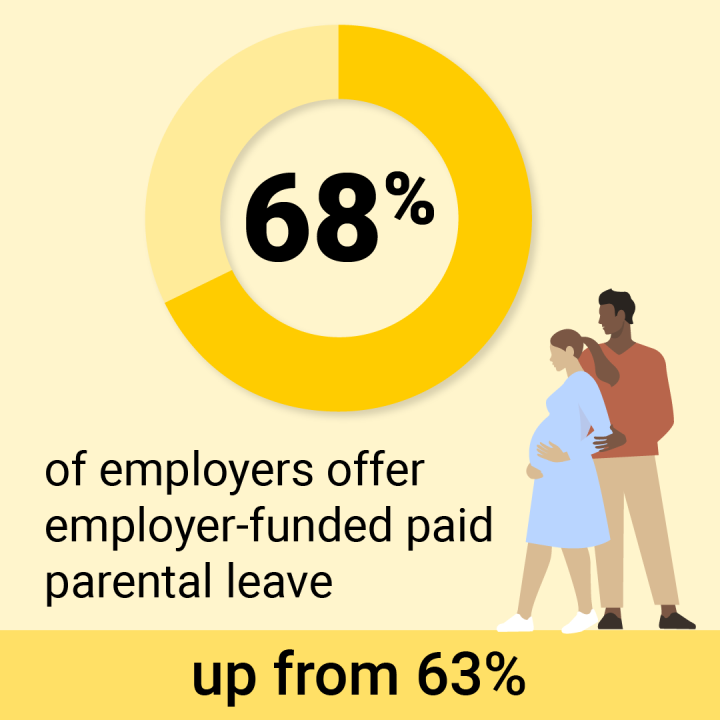Australia is witnessing a slow but meaningful shift toward creating more inclusive workplaces and supportive of families. The latest Gender Equality Scorecard 2023 – 24 from the Workplace Gender Equality Agency (WGEA) offers a glimpse into the progress being made and the challenges that remain. But are workplaces truly becoming more family-friendly, and what does this mean for families navigating the demands of modern life?
More Support for Families: A Promising Trend
There’s a clear upward trend in family-friendly workplace policies:

Employer-funded paid parental leave is now offered by 68% of workplaces, up from 63% the previous year.
Men taking parental leave: Men now account for 17% of all primary carer parental leave, up from 14%, showing a growing cultural shift in caregiving roles.
Flexible work policies: An encouraging 87% of employers now offer flexible work arrangements, acknowledging the need for parents to balance professional and personal responsibilities.
Image Source: WGEA 2024
These changes reflect a broader recognition by employers that supporting families is not just good for employees – it’s good for business.
Why Family Friendly Workplaces Matter
Family Friendly Workplaces can fundamentally reshape the experience of working parents and caregivers:
- Reduced stress and improved mental health: Access to flexible hours and remote working can alleviate the stress of balancing work with school pick-ups, childcare, and household management.
- Greater career opportunities for parents: Shared parental leave and part-time options in management roles allow both men and women to thrive professionally while raising a family.
- Breaking traditional caregiving norms: When workplaces actively encourage men to take parental leave, they help dismantle stereotypes, leading to more equitable caregiving at home.
These shifts mean that families are more likely to feel supported, with parents experiencing less burnout and children benefiting from more involved parenting.
Are Workplaces Caring More?
The numbers suggest that many workplaces are beginning to prioritise family-friendly policies, but there’s still a long way to go:
- Only 7% of management roles are part-time, despite 30% of women working part-time. This disparity limits opportunities for parents who need flexibility in senior positions.
- Male-dominated industries, such as construction and mining, remain the least likely to offer family-focused policies like universally available parental leave.
- Cultural shifts in caregiving are slow: While men’s uptake of parental leave is increasing, they still represent a small fraction of total leave taken.
However, the rise in flexible work arrangements and targeted gender equality initiatives indicates that employers are increasingly seeing the value of caring for their workforce holistically.
The Future of Family-Friendly Workplaces
For workplaces to truly embrace a family-friendly ethos, more systemic changes are needed:
- Flexibility at all levels: Designing part-time and flexible roles in senior management could open up opportunities for talented parents.
- Equal parental leave policies: Moving away from primary/secondary carer distinctions can encourage shared responsibilities at home and work.
- Comprehensive caregiving support: Providing childcare subsidies, school holiday care, and coaching for returning parents could make workplaces more accommodating for families.
These changes aren’t just a “nice to have”—they’re essential for attracting and retaining talent in a competitive labour market. Family-friendly workplaces can become the norm rather than the exception.
What This Means for Families
For families, the move toward more inclusive and supportive workplaces can mean:
- More time spent together: With flexible work options, parents can be more present for milestones and everyday moments.
- Less financial strain: Paid parental leave policies can ease the financial pressure during critical caregiving periods.
- A healthier work-life balance: By breaking down the traditional divide between work and family life, parents can thrive in both spaces.
Is your workplace family-friendly? At Family Friendly Workplaces, we believe in creating cultures that support every employee’s family and caregiving journey. Let’s work together to build a future where workplaces truly care.
Take action now and join over 600 organisations who have benchmarked themselves:
Read the complete report WGEA Gender Equality Scorecard 2023-24

